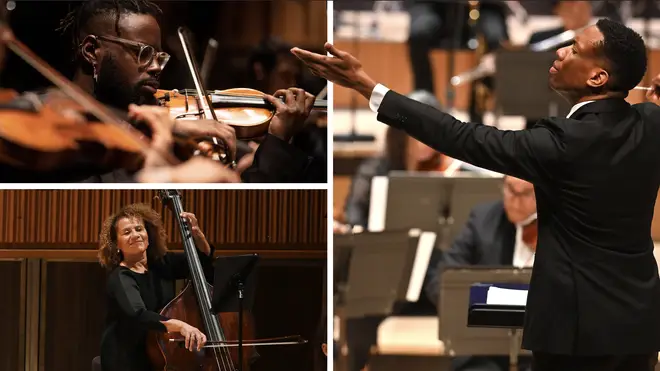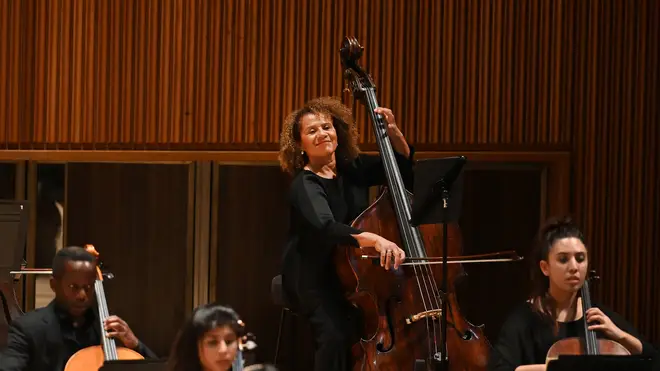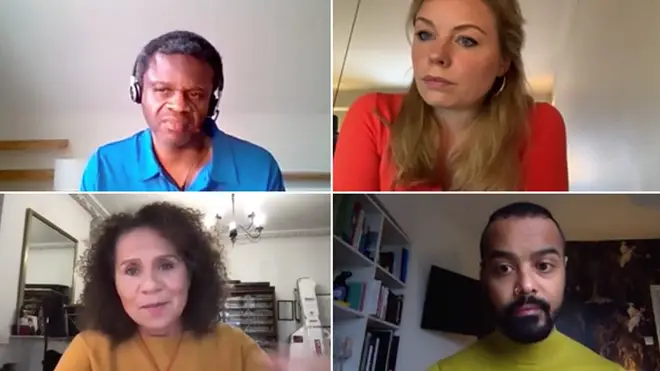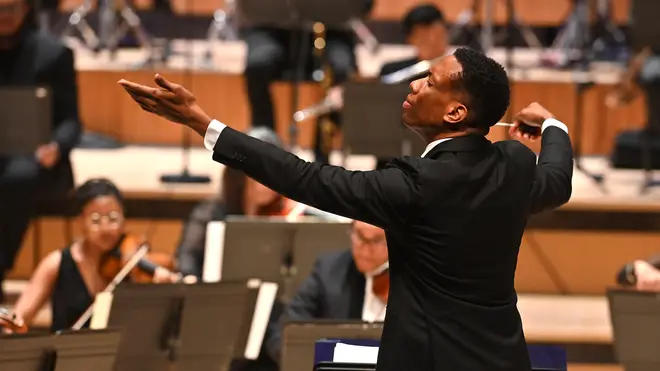On Air Now
Calm Classics with Ritula Shah 10pm - 1am
11 March 2021, 10:02 | Updated: 12 March 2021, 08:34

Nwanoku shines a spotlight on the current state of diversity in orchestras, and proposes a new approach to auditions to promote equity in hiring.
“When I speak to colleagues in America who have gone through auditions behind a screen, it’s hard to think that there’s not something in it,” Chi-chi Nwanoku says at the 2021 Association of British Orchestras (ABO) ‘Aftershock’ conference.
“Why is it that as soon as the screen’s gone, we don’t get the job?” the double-bassist and Chineke! Foundation founder posits during the conference’s opening panel about diversity in British orchestras.
This Wednesday (10 March), Nwanoku was part of a panel addressing equity, and the opportunities and experiences faced by Black, Asian and ethnically diverse musicians in UK classical music.
Read more: Chi-chi Nwanoku: ‘Classical music is suddenly going to become much more diverse’ >

Nwanoku was sharing her ideas around the proposed formation of a grant-giving alliance, designed to fund auditions for ethnically diverse musicians for orchestras in the UK and Europe. The European Alliance for Audition Support would create a framework to help diverse musicians attend auditions by subsidising costs through a funding model.
Nwanoku’s approach is inspired by the I.D.E.A. (inclusion, diversity, equity, accessibility) framework, currently adopted and in place around the world – notably in the the US where orchestras are supported in developing inclusive audition practices and building welcoming cultures, including screened auditions.
The UK model is currently based on ‘trialling’ musicians. Waiting to see how a diverse person ‘fits in’ in a section that is likely to have a homogenous bias already has clear limitations.
Read more: ‘Classical music has a long way to go’ - clarinettist Anthony McGill >

Anthony McGill performs 'You have the right to remain silent' with Cincinnati Symphony Orchestra
Chineke! Orchestra bassoonist and Musicians Union EDI Committee chair, Linton Stephens, was also on the panel. He points out: “We [Black musicians] just want to be given the same opportunity.”
“It is intimidating to walk into a room and see a sea of white faces,” says panel host Roger Wilson, who heads up operations for advocacy organisation, Black Lives in Music.
And Stephens agrees, pointing out the ‘exceptionalism’ that ends up being expected of Black and other diverse musicians, internally and, seemingly, externally.
“In classical music, where we have a huge demographic that doesn’t look like us, where we don’t have any representation, we add that extra expectation onto ourselves that not only do we have to play well, but we have to prove as Black people that we can play well,” he says.

“Yes, we talk about exceptionalism,” Chi-chi Nwanoku says. “That for Black people to win an audition, as Linton mentioned, we’ve got to be that much better. We’re accepted more if we’re exceptional.”
Read more: ‘Classical music thrives on people coming together’ – composer Matthew Rooke >
Addressing equity in UK orchestras today, and looking ahead to improving representation, the panel also spoke about how orchestras can improve diversity, and what it’s actually like for Black musicians being part of a still very white industry.
“The problem of diversity in classical music is, sadly, still ongoing,” panel host Roger Wilson said in his introduction, pointing out that “stirring social media statements are simply not enough.”

“Diversity training is really important, and I think that should be a part of what orchestras do,” Stephens says. “And not for five years, not until the funding runs out, but as core funding.”
Victoria Sayles, a violinist with London Mozart Players, points to focused diversity training as a solution too. And she outlines the other main ways orchestras can improve their approach to increasing diversity and equity in classical music:
“Organisations need to do more, not through token gestures, but by seeking advice from people who have lived this problem their entire lives, and know what the plan of action should look like from top to bottom.”
She also says funding is crucial, and creativity in approach where funds could be a problem is needed. Organisations can also be honest through the data they capture and make sure they’re representing their audiences truly. Transparency around auditions and hiring is also crucial. “Encouragement of diversity rather than avoidance and shame” is key.
Chi-chi points out that, even where Black or other diverse musicians do manage to get a seat in an orchestra, that orchestra’s intention and effort to improve culture is crucial. “If the culture has not evolved within that orchestra, eventually that Black person leaves,” she says.
“Because as they discover there’s no room for promotion, perhaps, or they’re hearing slide remarks about them being ‘just the token’, they eventually they feel so othered that they don’t want to stay.”

Classical music isn’t racist, insists Sheku Kanneh-Mason
Read more: UK orchestras ‘resilient and enterprising’ with 2% audience growth, says new report >
So how, according to the panelists, can classical music make meaningful, lasting change?
“Those who are holding the money, need to hold organisations accountable,” Nwanoku says succinctly. “Cut funding and say, ‘change or else!’”
“Be brave,” Linton Stephens’ advice is. “See where you want to go and make a route. You may come off the path, and you may end up in places you don’t know, but you’ll be on a route.”
For Sayles, as someone who isn’t Black, it comes down to listening: “Listen to the people that have lived this, and try to understand their perspective on it,” the violinist says. “If you don’t do that, you have absolutely no chance of making meaningful change.”
Panel host Roger Wilson adds “it’s about everyone working together in harmony,”
“If we don’t have this discussion, we can’t have action,” he says. “And action is not due. It’s overdue.”
Visit www.chineke.org/chineke-eaas to find out more about Chineke! Foundation’s European Alliance for Audition Support.